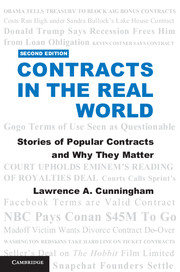Book contents
- Frontmatter
- Dedication
- Contents
- Annotated Contents
- Acknowledgments
- Introduction
- 1 Getting In: Contract Formation
- 2 Facing Limits: Unenforceable Bargains
- 3 Getting Out: Excuses and Termination
- 4 Paying Up: Remedies
- 5 Rewinding: Restitution and Unjust Enrichment
- 6 Writing It Down: Interpretation, Parol, Frauds
- 7 Performing: Duties, Modifi cation, Good Faith
- 8 Hedging: Conditions
- 9 Considering Others: Third Parties and Society
- Conclusion
- Appendix A Offering and Accepting
- Appendix B Buying and Selling Goods
- Notes
- Table of Cases
- Index
Introduction
Published online by Cambridge University Press: 05 March 2016
- Frontmatter
- Dedication
- Contents
- Annotated Contents
- Acknowledgments
- Introduction
- 1 Getting In: Contract Formation
- 2 Facing Limits: Unenforceable Bargains
- 3 Getting Out: Excuses and Termination
- 4 Paying Up: Remedies
- 5 Rewinding: Restitution and Unjust Enrichment
- 6 Writing It Down: Interpretation, Parol, Frauds
- 7 Performing: Duties, Modifi cation, Good Faith
- 8 Hedging: Conditions
- 9 Considering Others: Third Parties and Society
- Conclusion
- Appendix A Offering and Accepting
- Appendix B Buying and Selling Goods
- Notes
- Table of Cases
- Index
Summary
The wedding celebration of Leo and Elizabeth Facto took place on a humid August night in a New York City suburb. The ceremony was complete and their reception in full swing. They had rented a beautiful banquet hall, where champagne flowed, a band played, and a photographer preserved the memories. As the 150 guests kicked up their heels, one hour into the gala, an electric power failure gripped the region. The air conditioning shut down, the music died, and picture taking stopped.
Their night ruined, the Factos sued the banquet hall for a refund of the $10,000 they paid months earlier when they signed their rental agreement. The Factos, like many people, thought a full refund was in order. After all, the Factos deserve sympathy, as they will never have their big celebration. The banquet hall countered that it was blameless for the regional power outage. It argued that the Factos had signed a contract to pay the $10,000 and they should be bound to that.
The judge decided the case based on well-established principles of contract law that govern with an even hand. The court noted that the banquet hall could not control the power grid, yet the outage made it impossible for the hall to perform its side of the deal. That meant the hall was excused from its duty to do so. But contract law also provides that when one side is excused from performing because of an uncontrollable event, the other side is excused too. So the Factos were likewise freed from their duty. However, to be fair, the court also ruled that the couple had to pay for the services they received. The hall was entitled to payment for decorations, candles, tables, and the food and beverages it served before the power outage; the Factos got a refund of the balance.
Contract law has wrestled with dilemmas like this for a long time and has forged well-worn paths through them. Solutions to contemporary problems, such as those the Factos encountered, can be found in cases that are scores or even hundreds of years old. Many people, among experts and the general public alike, wrongly think that such classic contract law cases makes the subject dusty and dull.
- Type
- Chapter
- Information
- Contracts in the Real WorldStories of Popular Contracts and Why They Matter, pp. 1 - 10Publisher: Cambridge University PressPrint publication year: 2016



